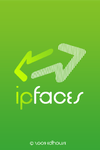IPFaces mobile framework
iPFaces is a mobile application framework for creating native, form-oriented network applications for mobile devices. iPFaces is a product of Edhouse company. Currently, there is support for iPhone, iPod touch, iPad, Android, BlackBerry and phones equipped with Java ME (mobile Java).
| Limited liability company | |
| Industry | Computer Software |
| Founded | 2006 |
| Headquarters | Zlín, Czech Republic |
Key people | Mgr. Pavel Stržínek, director/software engineering |
| Products | iPFaces Mobile Framework, LIKee, D-zone |
Number of employees | 20 |
| Website | sourceforge |

iPFaces
Programmer does not need to have knowledge of the targeted mobile platform. The entire application logic is transformed to the central application server level. Server platforms currently supported include ASP.Net, Java, and PHP.[1] Developers with knowledge of these platforms can leverage their experience and be more productive.
iPFaces solution consists of two parts:
- client - a client application running on target mobile device
- server packages - a software library used by developers for writing application logic on the server.
Licensing
iPFaces server packages are distributed in two versions:
- Community Edition - free software distributed under GNU GPL version 3 (license published by Free Software Foundation)
- Commercial Editions - for commercial, proprietary deployments.
iPFaces user clients for BlackBerry and Java ME devices are distributed as freeware.
Source code examples
Below are three examples of a Hello World application written in PHP, Java and ASP.Net.
PHP
<?php
require "ipfaces-php-lib-1.1.php";
$ipf_form = new IPFForm();
$ipf_screen = $ipf_form->addScreen("screen", "First Application");
$ipf_screen->addLabel("label", "Hello World");
$ipf_form->render();
Java
<%@ taglib prefix="ipf" uri="http://www.ipfaces.org/tags" %>
<ipf:form>
<ipf:screen title="First Application">
<ipf:label text="Hello World"/>
</ipf:screen>
</ipf:form>
ASP.Net
<%@ Page Language="C#" AutoEventWireup="true" CodeBehind="FirstApplication.aspx.cs" Inherits="HelloWorld._Default" %>
<%@ Register Assembly="iPFaces.NET" Namespace="Org.IPFaces.Net.Controls" TagPrefix="ipf" %>
<ipf:Form ID="form1" runat="server">
<ipf:Screen ID="screen1" runat="server" Title="iPFaces Form">
<ipf:Label ID="label1" runat="server"/>
</ipf:Screen>
</ipf:Form>
This code represents the visual representation of the application.
File FirstApplication.aspx.cs looks like:
using System;
using System.Data;
using System.Configuration;
using System.Collections;
using Org.IPFaces.Net.Controls;
using Org.IPFaces.Net.Pages;
namespace FirstApplication
{
public partial class _Default : Org.IPFaces.Net.Pages.Page
{
protected void Page_Load(object sender, EventArgs e)
{
label1.Text = "Hello World!";
}
}
}
Notes
- "stated by the producer". Archived from the original on 2012-01-19. Retrieved 2011-11-16.